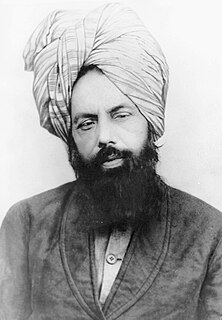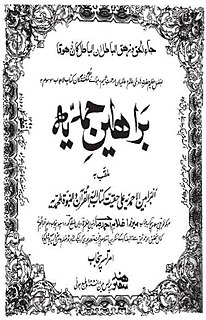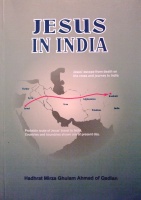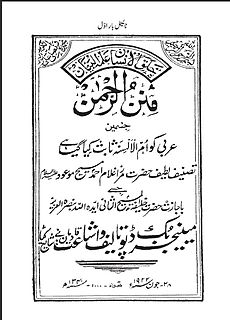 W
WMirza Ghulam Aḥmad was a religious figure from India, and the founder of the Ahmadiyya Muslim Community. He claimed to be the Mujaddid of the 14th Islamic century, the promised Messiah, and the Mahdi awaited by the Muslims in the end days. He declared that Jesus (Isa) had in fact survived the crucifixion and later died a natural death, after having migrated towards Kashmir and that he had appeared in the likeness of Jesus.
 W
Wal-Barāhīn al-Ahmadīyyah 'alā Haqīqatu KitābAllāh al-Qur'ān wa'n-Nabūwwatu al-Muhammadīyyah is a five-part book written by Mirza Ghulam Ahmad, the founder of the Ahmadiyya Movement. The first two parts were published in 1880 CE, the third volume was published in 1882, the fourth volume in 1884 and the fifth volume in 1905. In writing the book, Ghulam Ahmad sought to rejuvenate Islam by arguing for the validity of its principles and vindicating its teachings in response to Christian and Hindu polemics against Islam as well as atheistic philosophies. In this context, a significant portion of the subject matter of the book is dedicated to the defence of Islam as a whole against the criticism of Muhammad, the Qur'an and Islam that was raised in the 18th and 19th centuries predominantly by Christian missionaries and Hindu revivalists.
 W
WBlessings of Prayer (Book) [English rendering of barakatud Du‘a (Urdu)] is a book by Mirza Ghulam Ahmad, published in 1893. It was written in refutation of Sir Syed Ahmad Khan’s view that there is no such thing as the acceptance of prayer, and that prayer is no more than a form of worship. Ahmad proclaims that Allah hears and accepts the supplication of believers which are offered in humility and sincerity, and that the acceptance of prayer sets in motion its own chain of causes which culminates in the fulfillment of the objective prayed for.
 W
WThe British Government and Jihad is a book written in 1900 by Mirza Ghulam Ahmad, the founder of the Ahmadiyya movement in Islam. An alternative title is the True Meaning of Jihad. It was published on 22 May 1900 and was translated into English in 2006, by Islam International Publications.
 W
WThe book Commentary on The Holy Quran: Sura al-Fateha has been compiled from the writings and Pronouncements of Mirza Ghulam Ahmad of Qadian. It has been translated into English by Sir Muhammad Zafrulla Khan.
 W
WThe Criterion for Religions, the English rendering of Mi‘yarul Madhahib, was written and published in 1895 by Mirza Ghulam Ahmad, founder of the Ahmadiyya Muslim Community. This English edition was published in 2007, by Islam International Publications
 W
WJesus in India is a treatise written by Mirza Ghulam Ahmad, the founder of the Ahmadiyya Movement in 1889. The treatise, which was then published as a book, puts forward the view that Jesus survived crucifixion, left Judea and migrated eastward in order to continue his mission to the 'Lost Tribes of Israel', traveling through Persia and Afghanistan and eventually dying a natural and honourable death in Kashmir at an old age. Ghulam Ahmad applied textual analysis of both the Gospels and Islamic sources – the Quran and hadith – and also drew upon medical and historical material, including what he claimed were ancient Buddhist records, to argue his case. Modern scholars such as Norbert Klatt (1988) have rejected Ghulam Ahmad's use of these latter sources as misreadings of material unrelated to Jesus.
 W
WMaktoobat e Ahmad [Urdu- مکتو بات احمد; Letters of Ahmad (1878-1908) ] is a 3-volume collection of all available letters, written by Mirza Ghulam Ahmad in response to the queries and letters of his friends, companions and scholars.
 W
WMalfūzāt is a ten-volume collection comprising the discourses, question-and-answer-sessions, sermons and dialogues of Mirza Ghulam Ahmad, the founder of the Ahmadiyya movement. The volumes contain, for the most part, speech that was transcribed by several of Ghulam Ahmad's close disciples as it was being communicated and was published in Ahmadi periodicals during his lifetime, covering a period starting from 1891 until his death in 1908. This material was compiled and published as a set of volumes during the 1960s.
 W
WArabic - the Mother of all Languages - (Book) Minan-ur-Rahman [Arabic: منن الرّحمٰن ] is a brief treatise on Philology by Mirza Ghulam Ahmad, (1835-1908) written in May 1895. Ahmad claimed that Arabic was the first language taught to man by God Himself and the Mother of all languages. He highlighted certain peculiarities of the Arabic language, which he claimed could not be found in any other language and challenged his adversaries, to refute his claim also addressing Max Muller (1823-1900) to come forward and meet the challenge.
Our Teachings is an Urdu book published in 1902 by the founder of the Ahmadiyya movement, Mirza Ghulam Ahmad of Qadian, India. Mirza Ghulam Ahmad, a Messiah and Mahdi claimant, attempted to revive the purported original and pristine teachings of Islam. He entitled the book "Noah's Ark", implying that those who wanted to be saved from the deluge of irreligion and materialism should join the Ahmadiyya Muslim Community. Published in many languages, this English edition has been published by ‘Islam International Publications Limited’; Tilford, Surrey GUI0 2AQ. U.K. ISBN 1-85372-394-0] (1990)
 W
WThe Philosophy of the Teachings of Islam is an essay on Ahmadiyya Islam by Mirza Ghulam Ahmad, founder of the Ahmadiyya religious movement. The original was written in Urdu with the title Islami Usool ki Falāsifi, in order to be read at the Conference of Great Religions held at Lahore on December 26–29, 1896. It explicitly deals with the following five broad themes with detail set by the moderators of the Conference:the physical, moral, and spiritual states of man; what is the state of man after death? the object of man's life and the means of its attainment; the operation of the practical ordinances of the Law in this life and the next; sources of Divine knowledge
 W
WNishan-e-Asmani also called Shahadat-ul-Mulhimeen is a book in Urdu, by Mirza Ghulam Ahmad of Qadian, India, claimant to be the promised Messiah and Mahdi, Founder of the Ahmadiyya Muslim Jamaat. The English rendering of Nishan-e-Asmani was done by Muhammad Akram Ghauri, published by The Islam International Publications Ltd. ‘Islamabad’ Sheephatch Lane,Tilford, Surrey GU10 2AQ, United Kingdom (2005).
 W
WThe Will (Book)
 W
WVictory of Islam is the first in a series of three books by Mirza Ghulam Ahmad, the founder of the Ahmadiyya Movement, wherein he extensively sets out and explicates his claims; the others being Tauzīh-e-marām and Izāla Awhām. It was published in 1891 CE.